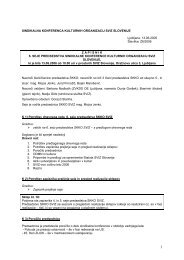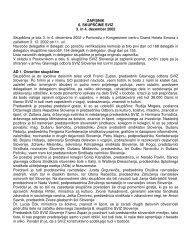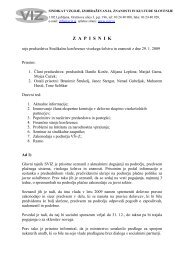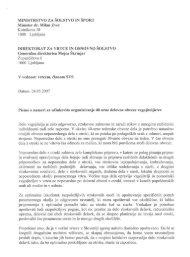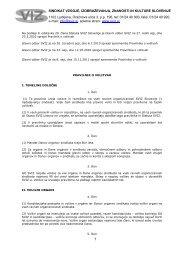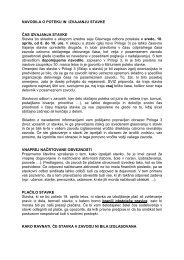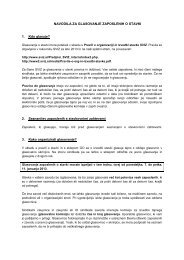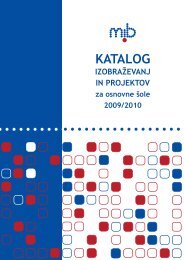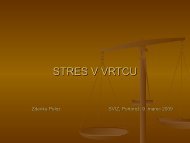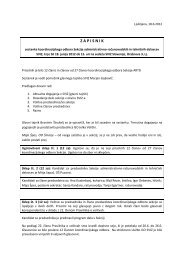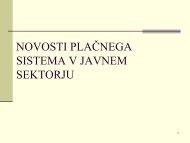The use and misuse of teacher appraisal - Education International
The use and misuse of teacher appraisal - Education International
The use and misuse of teacher appraisal - Education International
You also want an ePaper? Increase the reach of your titles
YUMPU automatically turns print PDFs into web optimized ePapers that Google loves.
T H E U S E A N D M I S U S E O F T E A C H E R A P P R A I S A L<br />
number <strong>of</strong> proposals to tie certification to <strong>appraisal</strong>. Under these scenarios, <strong>teacher</strong>s<br />
lose certification with poor <strong>appraisal</strong>s. Peer review has been part <strong>of</strong> <strong>appraisal</strong> in just<br />
a few places for many years, but is now a growing practice in developing new<br />
<strong>teacher</strong>-<strong>appraisal</strong> systems. Sometimes the approach is specified within the contract,<br />
not the state. For example, the state <strong>of</strong> Florida’s Senate Bill 736 requires all different<br />
approaches except peer review. In New Jersey, connecting <strong>appraisal</strong> to compensation<br />
is not in the law, but it can be found in the Newark, NJ contract. <strong>The</strong> current effort<br />
across the country is to connect <strong>teacher</strong> <strong>appraisal</strong> to all <strong>of</strong> these.<br />
All public classroom <strong>teacher</strong>s are appraised. Private-school <strong>teacher</strong>s are not required<br />
to follow the laws regarding <strong>teacher</strong> <strong>appraisal</strong>s. However, there is a growing movement<br />
to develop <strong>and</strong> implement <strong>appraisal</strong> systems that assess non-classroom educators <strong>and</strong><br />
education support personnel.<br />
Most state legislations <strong>and</strong> other existing regulations require that probationary (nontenured)<br />
<strong>teacher</strong>s be appraised before they are awarded “tenure” or a continuing teaching<br />
contract. Teachers who have achieved “tenure” or other pr<strong>of</strong>essional status tend to<br />
be appraised far less frequently. However, the <strong>appraisal</strong> process may differ across states<br />
<strong>and</strong> jurisdictions. <strong>The</strong> amount <strong>of</strong> time, frequency <strong>of</strong> observation, <strong>and</strong> the findings <strong>of</strong><br />
a <strong>teacher</strong>’s recent <strong>appraisal</strong> report can significantly impact the <strong>appraisal</strong> process. In some<br />
systems, this could mean five observations per year (DC schools); in others, as few<br />
as one. New (non-tenured) <strong>teacher</strong>s are evaluated three times a year <strong>and</strong> veteran <strong>teacher</strong>s<br />
between once <strong>and</strong> twice yearly. All laws require the school districts to give every <strong>teacher</strong><br />
a final rating at the end <strong>of</strong> each school year. States are beginning to pass new<br />
legislation <strong>and</strong> regulations requiring more frequent or annual <strong>appraisal</strong>s.<br />
Most <strong>teacher</strong> <strong>appraisal</strong> systems or frameworks are developed by state authorities, while<br />
local districts <strong>of</strong>ten control the procedures <strong>and</strong> processes. In most parts <strong>of</strong> the US, the<br />
state sets basic parameters (by law) <strong>and</strong> the district works with the local union to develop<br />
a detailed system. In places that have collective bargaining, evaluation is part <strong>of</strong><br />
those discussions. However, an ever-increasing number <strong>of</strong> places have made evaluation<br />
a prohibited subject for bargaining (e.g. DC, Tennessee, <strong>and</strong> Wisconsin). This means<br />
the <strong>teacher</strong>s cannot be involved <strong>and</strong> the school district administration sets the rules.<br />
Principals are the primary evaluators. Given that <strong>teacher</strong> <strong>appraisal</strong> systems are<br />
becoming more high-stakes, there is an increasing dem<strong>and</strong> that evaluators be trained<br />
<strong>and</strong> can demonstrate reliability. In addition, with new legislation <strong>and</strong> regulations<br />
dem<strong>and</strong>ing annual evaluations, there is an increasing need to build capacity. More external<br />
evaluators <strong>and</strong> other <strong>teacher</strong>s are being trained to serve as evaluators as the need for<br />
evaluators continues to increase. <strong>The</strong> quality <strong>and</strong> reliability <strong>of</strong> requirements for training<br />
evaluators vary widely among jurisdictions. According to the <strong>teacher</strong> unions in some<br />
35




